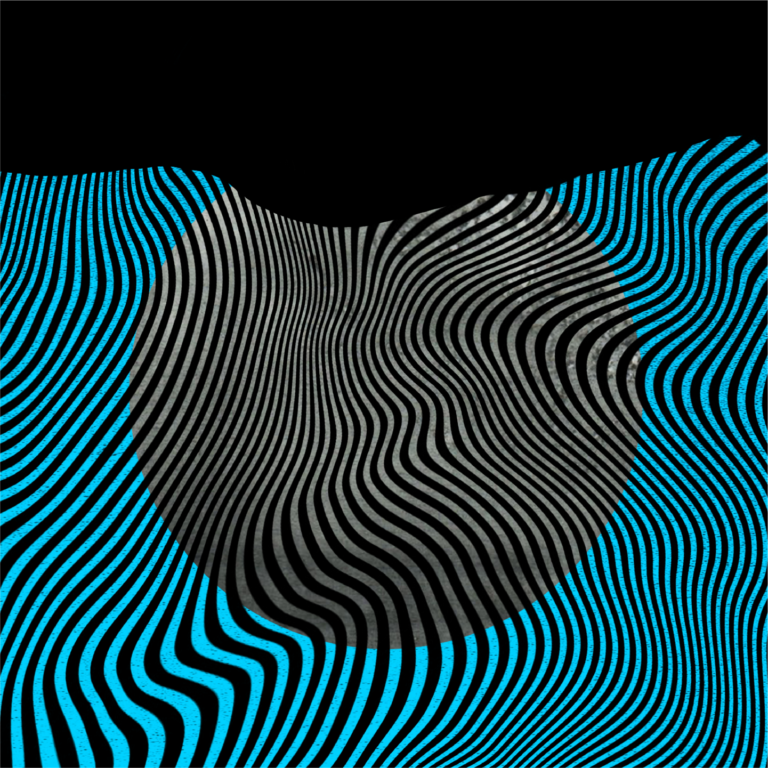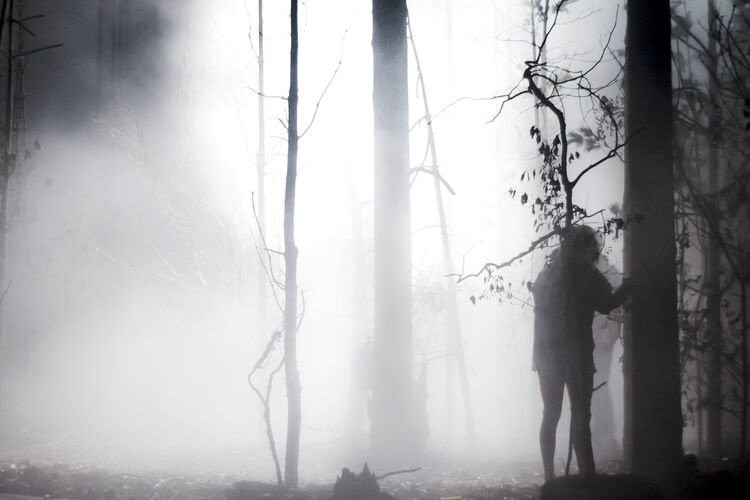Questo articolo è disponibile anche in:
Italiano
Outside, late evening.
They are sitting at a table of “Au Cadran Voltaire”1, after Gisèle Vienne’s play This is How You Will Disappear, staged at the Théâtre national de la Colline in Paris from 6th to 15th January, 2023. They order two glasses of Chardonnay, a carafe of water and a vegetarian dish à partager2 After small talk, they begin a conversation about the show they have just seen…
Marta: In my opinion, the play was about male violence.
Ilaria: I agree, but there is more. Staying with this, it seemed to me that the play spoke of the Masculine in the most universal sense of the term, that is, of a power that acts in the world with violence and authority. I saw this concept embodied on stage by the figure dressed in white, wearing a sweatshirt with the inscription ‘FRANCE’: in my opinion, he is a representation of the nation-state. Observing his actions and the way the narrative arc unfolds, I believe that there emerges a profound critique of authoritarianism and also a denunciation of all those policies masquerading under the word ‘democracy’ but which turn out to be dictatorial in the end…
The waiter brings drinks
Marta: Now that you’ve pointed it out, that sweatshirt reminded me of old memories of old Italian campaigning and attitudes similar to the ones you described… However, despite the fact that your reading is fitting and absolutely plausible, I also feel that the political discourse could rather decline into a critique of the state, insofar as it remains immobile and leaves men, as the male gender, unpunished. However, in this case I take sides and I propose an intentionally authoritarian reading: I support the theme of critique of exquisitely masculine violence.
Ilaria: I think that one interpretation does not necessarily exclude the other. Indeed, in some ways they are complementary. The Masculine is itself embodied in the State (and therefore in politics), precisely because of the principle I mentioned above, but also – more trivially – because of the preponderant presence of men power’s positions. Here, the power. suppose it is another theme, inevitable, I would say, given what we have said so far. Of course, nothing is so explicit: the narrative (which, then, there is no “plot” in the traditional sense, they are kind of frames within a narrative arc…). was saying… the narrative is developed by physical actions – acted in typical Vienne slow-motion practice (CROWD3 came to mind) – and very few words, expressed by amplified voices. It seems to listen to the inner thoughts of the characters, who are three: a perfectionist gymnast, a lapsed rock star, and the white-clad figure in the FRANCE sweatshirt (the state, the power, the society. the masculine…).
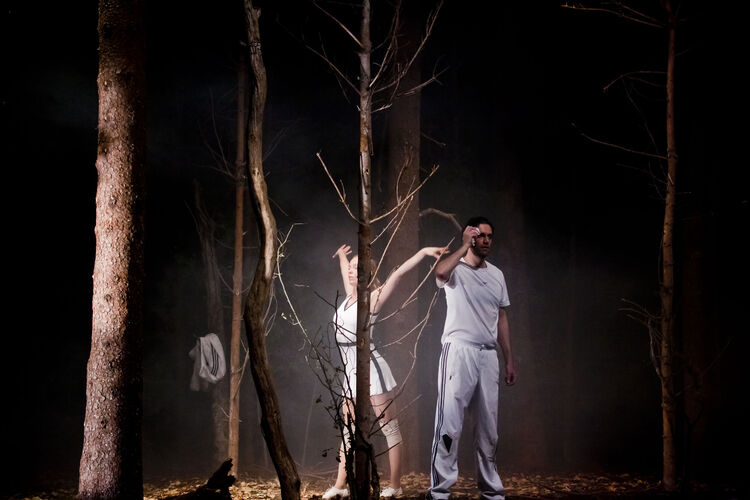
Retrospective)
Marta: I think the words we hear are mostly the thoughts of the characters, apart from a few brief interactions. For me, the highlight is the fixed scene: we are in a gloomy forest… no, wait, that’s too much of a Dante reference. Here, we are in a dark forest: pines and various conifers occupy the stage against a black background. At a glance, I found it very suggestive. It would have been interesting if the audience could have sat in the middle of that forest.
Ilaria: It was suggestive for me too, perhaps also because it was a very realistic setting… I found the carpet of dry leaves interesting. First of all, because it hid the path and in my opinion in this sense it becomes signifying: in fact, it amplifies the metaphor of bewilderment suggested by the macro-context of the gloomy forest (here, I leave Dante’s reference). Then, that layer of leaves fascinated me because of the sounds it released.
Marta: Alright, the dark forest…but FRANCE was a little beyond halfway through the journey of his life, wasn’t it? Although now middle age refers more to the 50-60 range… [she picks up phone] [prende il telefono] Gosh…Ila, Google claims that the middle age range is from 40 to 60…
The dish arrives, giving (thankfully) an early end to a possible endless age debate. The two ask for sauces and begin dinner.
Ilaria: Marta, stay focused, we were talking about the dark forest … It is a setting that is not only given by the scenography, but is also constructed through a complex sound design, composed of layers of electronic processing, amplified in the hall by speakers positioned both in front and behind the audience. The intent – that is successful – seems to me to be a total involvement of the spectator: they, although seated in the chair to enjoy the performance frontally – find themselves totally immersed in an abstract space, a limbo in which time is suspended and inhabited by uncomfortable truths of the unconscious of individual interiorities… what a turn of phrase…
Marta: I’m always very admired by your mental onanism about sound… Mine, however, is about the visual and narrative aspect. In fact, for me, the play begins with a biblical episode, revised in a dystopian light: Adam and Eve in a dark forest, he, a “middle-aged” man, wearing a FRANCE sweatshirt and she, a girl barely in her teens, dressed like a gymnast. He’s helping her with a series of exercises: crunches, jumping jacks, handstands… (I’d be forgiven for thinking that somehow you have to spend the time in the Gloomy Forest of Eden). They are not happy or cheerful, though… they are gloomy (as a matter of fact) and sad. They are alone and he seems to be in pain…he seems to want to counteract an evil force within himself…She appears more determined (or resigned). She is carrying out the task she has been given. And he seems more and more troubled, more and more entangled in conflicting feelings….
Ilaria: It is really interesting your point of view, I had not interpreted it at all as a reference to Adam and Eve, but the allusion is not to be excluded. My mind has always remained on the more generic level: for me FRANCE is a presence that is only manifest to our eyes and there, on the scene, but which is actually invisible: it is, precisely, a force that violently imposes its power. It is thus in general the weight of social superstructures from which we cannot free ourselves, so, as you said, everyone – like the gymnast – stands there to do the task assigned to them, passively. It is a slow process of annihilation that in the long run creates such a significant constraint on the person that he/she completely loses his/her critical thinking and identity, ending up at the mercy of a system…
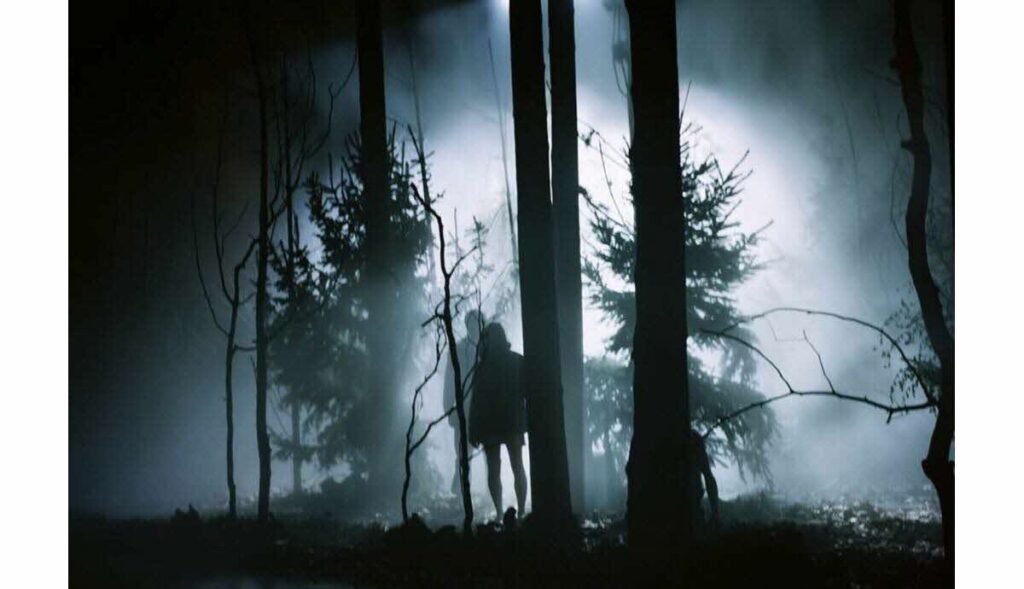
Retrospective)
Marta: Yes, maybe … But what you are describing is something that we all go through during our lives. That’s why I would like to give FRANCE more concreteness. I feel that the play needs to be interpreted without too much abstraction. Right now, I need something concrete. [addenta una patatina]. FRANCE also has visions. He is plagued by nightmares…maybe his sense of guilt?
Ilaria: I would like to specify that my abstraction is concrete: it is what you said, a social pressure (between canons and rules) that we all undergo. I say it is “invisible” insofar as I couldn’t see it as a physical person, as a character, but as a kind of “rule,” invented by people to live together. FRANCE’s visions and torments in my opinion manifest recognition of the injustices that these “false-truths” entail. To admit it, is too difficult, so to work inside himself is a kind of unavoidable collective guilt; the cause of which one does not want to see, because it would undermine everything one has thought up to that point to be right, true, good…
Marta: Although I personally don’t think guilt is inevitable, in the play maybe it emerges in that sense… but I always find it very confusing. At one point, he appears almost sneakily, dressed in black against a black background: the rock star. There, in him I saw the features of Sid Vicious, the one from the Sex Pistols. Pointy hair, chain around his neck…and by the way it’s fitting because he was accused of killing his girlfriend Nancy…anyway, when this individual appears, Adam follows him, leaving Eve alone. In a forest. At night. And then, to add to the confusion…fog.
Ilaria: Here, the fog … In retrospect I have to say… that moment … I liked it! I said in retrospect because at first, I thought it was a bit of a big production “coolness.” And maybe in part it is. But then I got carried away. I think it is dramaturgically coherent and further contributes to the immersiveness I mentioned earlier in reference to the sound. It wouldn’t have aroused the same effect if there weren’t those low frequencies accompanying all that fog that invaded the audience from the stage for a long time (it lasted at least three minutes, didn’t it?). Eventually the stage was completely white and we were enveloped in that thick smoke. Involved in that non-place, like so many lost souls…
Marta: The fog was very interesting, but … I think I experienced it with more disillusionment. I was trying to quell the coughing…and like me I remember others in the hall. I even dropped a throat tablet, which was left shining on the dark carpet of the theater…in short, I got distracted.
So the fog…yes, effective but not outstanding, I think it served mainly to divide the first from the second act…in fact afterward there are Sid Vicious and Old Adam talking again. The former confesses to the crime: he killed his partner after raping her. Adam becomes agitated and beats him, but Sid begs for mercy. He begs not to end up like his girlfriend… And do you know what made me angry? That Adam listens to him. He pauses. I think Adam and Sid is the same person: two sides of the same coin, but tainted by each other. Adam manages to curb his worst instincts, but he is perpetually seduced by them, while Sid succumbs to them, and it was at that very moment that he recognized his humanity and the injustice he had committed. Then, Adam gives in and kills him. I think the point of this whole scene was to show that the human being, and particularly the male gender, is unable to give up violence.
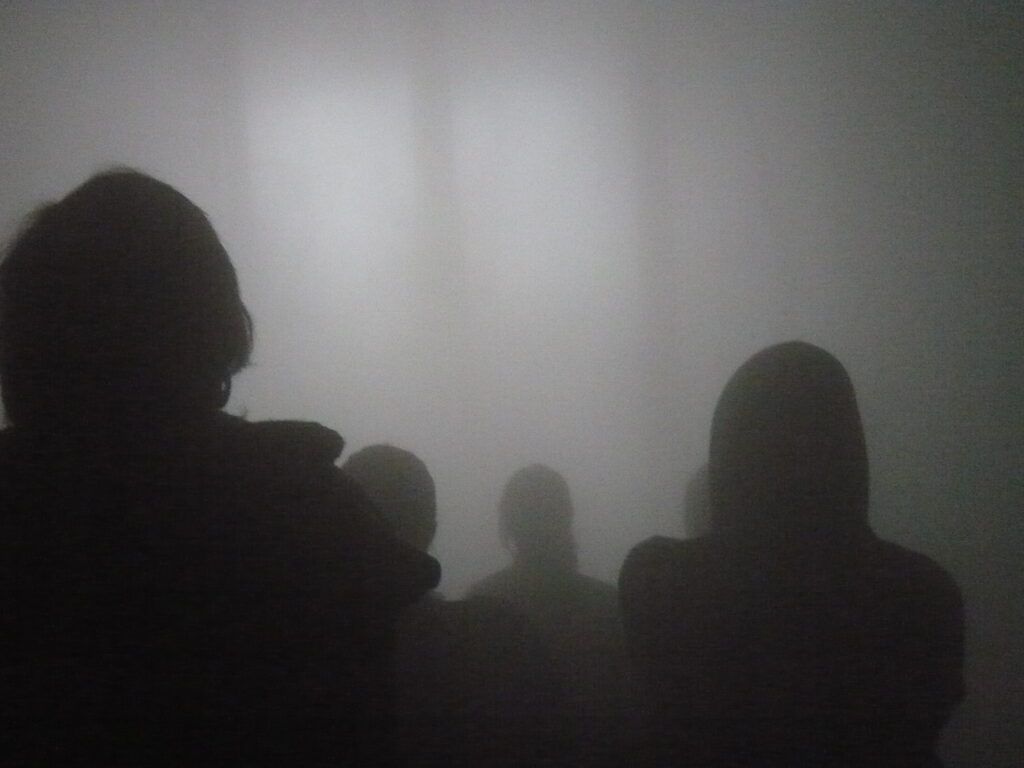
Ilaria: Yes, you’ve hit the point. I also guess that, in the end, the play is a denunciation of the system of judgment and so of the social system. The violence of the Masculine wins because the human being needs to purify himself. Adam-FRANCE is upset at Sid’s letting go of the worst instincts because he recognizes them as his own and the reaction is to suppress them (killing him in this case). The two sides of the same coin, as you said. So maybe it’s true, there is something that refers back to the masculine, whether it’s the gender or in an abstract sense. So I remain of the idea that the two complement each other: there is a double complaint and I remain convinced that there is also the political dimension, in Vienne4.
Marta: I disagree about the need for purification, which I see more as a religious issue. From my point of view, yes, there was a representation of violence seen as evil on the stage. However, I do not think this view is applicable to Adam’s gesture on Sid, but rather to Adam and Sid’s gestures on their respective female counterparts. I was almost pleased with Adam’s violent gesture toward Sid. It had something right about it, but that is not why I compliment Adam-he cannot, as you say, “purify himself.”
Ilaria: Let me elaborate on the purification issue. I start right from one of your sentences: «I was almost pleased with Adam’s violent gesture toward Sid. It had something right about it, but that is not why I compliment Adam». It’s true, to feel that violence as right is something human, precisely because, as I was saying and as you well reiterated, it’s part and parcel of our nature. But at the same time, I think the sense of relief comes from the fact that Adam’s violence on Sid corresponds to the condemnation of an act considered by the law, -and therefore by common morality- a crime (Sid killing Nancy). If Sid had killed Adam (I am still calling him “Adam” just for the sake of understanding, but for me he remains FRANCE) it would have had a completely different meaning, in my view.
Marta: If Sid had killed Adam it would have been the coup de theatre5 we all need….
Ilaria: Perhaps the play therefore tries to make us think about the fact that we can justify Adam’s violence while we cannot Sid’s, or not entirely…but still we are talking about violence.
Marta: So far we have interpreted the play using the concepts of Good and Evil … I wonder now instead if we should look at it in a different light, perhaps more “cynical”, if you will. Let us examine the concept of violence as a name we give to an action.
Ilaria: Instead, I feel we really need to talk about Good and Evil because I think the play wants to question this dichotomy and, at the end of the day, get to what you are saying. In my opinion, the point that Vienne brings us to, is to show that we are able to justify the violence of Adam-FRANCE by virtue of the fact that we cannot admit to ourselves that violence (and thus everything we brand with the term “evil”) can exist in the human soul. Here then is what I mean by purification: we need to “free ourselves from evil” [and here, yes, we are on the religious side, but then again, we are talking about society and politics…]. And we do this by admitting the existence of right and wrong violence: the right one eliminates what is not tolerated. So you are right when you say that purification cannot really happen, but, Vienne suggests, we need to believe it. FRANCE, as you also note, is troubled before and remains troubled after, in fact.
Marta: However, I think Vienne dwells mostly on showing how violence is part of being human. Considering the natural setting, it seems to me that it tells us maybe violence originated as a tool of self-defense, but because humankind is afflicted with this terrible cross that is the ability to think, we tend to use physical (and verbal) violence also as a tool of “justice,” of reckoning, of shortcutting. It seems to me that then emerges the fact that violence is also instinct, so we find it in both reason and the unconscious. Think also of the final scenes: men (played by moving dummies) look at Sid’s corpse and do not blink. Next scene, an owl (a real one!) flies quietly through the woods, HIS woods, the place where he naturally lives, and again a man, a hunter, armed with a bow and arrow, tries to kill him. And he will probably succeed, because it is an unequal fight-another example of how man has used the mind to “improve” and “perfect” his violent range.
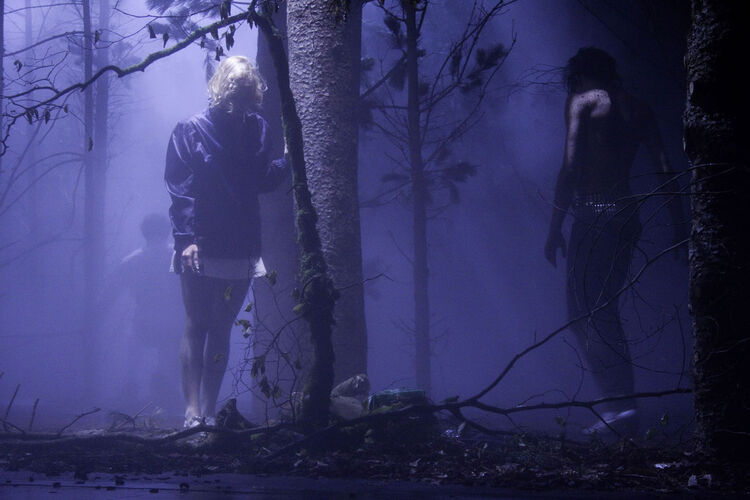
Retrospective)
Ilaria: You are right. I don’t entirely agree about the unequal struggle, however. I believe that the owl, quiet in its habitat, is not weaker than man… Its problem is that it is deceived by the hunter who should live with it and instead makes a prey of it, for no real reason: it is certainly not a natural necessity. And he makes a prey of it both to improve and perfect his violent range, as you said, and out of pure thirst for power and control over the other (and the environment). It is also not an unequal struggle for another reason: I saw the dialectic between the forces of the Feminine and the Masculine return in this scene. If you remember, the same trajectory of the owl is run by the gymnast, dressed in the same colors as the animal, just before. A bit didactic, I thought, but it works… However, I keep talking about forces precisely because I don’t think it’s a gender issue: the fact that the female figures are the victims, it is just a denunciation of the victory – in the human soul – of the Masculine – understood as the violent and destructive side – over the Feminine – understood as the side of care, regeneration and attention to the other and to the world around…
They ask for another glass of Chardonnay and finish the last few chips, almost in silence, were it not for a few more exchanges about concepts of aesthetics and “facezie varie”6.
Anyway, in my opinion we are there with the interpretation, because this questioning of common morality and investigation of the taboos of the unconscious is a path of research that Vienne has been pursuing for some time, see in particular Jerk7 and his last work L’etang8. If in those two he was going to delve into uncomfortable corners of human interiority – one into the thoughts of a serial killer, the other into the troubled mind of a teenager – in this case it seems to me that he really intends to highlight the impact of the social and political on individual interiorities.
Marta: I confess that, other than that, of the Vienne I only saw Crowd. A show that probably could have lasted 10 minutes if she hadn’t made all the dancers move in slow motion, in a rave that even our government would approve of for its calmness. Anyway, I was thinking–do you think Vienne is trying to tell us that human beings are as unhappy or violent as serial killers because of politics and society? On This is How You Will Disappear I remain of the opinion that the message is that it is the male gender that spreads the greatest load of reasoned and malicious violence.
Ilaria: In my opinion Vienne makes us think about the fact that violence is part of human nature, while politics and society are an equally human product, a need… but these are matters of fragile balances, because they have to do with the question of power, which needs to keep itself stable and therefore tends to control and rule. The problem that I think Vienne confronts us with — and which suggests the human unhappiness you speak of — is that this control, for Power is normal: it is up to individuals not to go along with it, preserving their right to self-determination and their critical thinking, to challenge the false truths and rules of behavior that Power tends to inculcate in everyone so that there will be obedience…
Marta: Like the concept of middle age… Io veramente9…
Anyway, … I think politics and power are also shown as two “entities” that do not listen to everyone although they preach to listen to most. However, this triggers the strong reaction of self-determination, which is a concept to be defended at all costs, but at the same time brings a number of frailties in dealing with a world that has gradually abandoned the sense of “panic fusion” (however, let’s leave D’Annunzio alone, which is best left dormant at the moment). [D’Annunzio’s spirit still beats a beat]. [Lo spirito di D’Annunzio batte comunque un colpo].
Ilaria: In this sense…I think there is a denunciation of the socio-political violence that imposes standards of life and behavior: in my opinion on stage we see the gradual disappearance of the right of self-determination. Which is then also a way of operating a kind of purge of what is considered by society to be different and therefore uncontrollable and out of the norm…and here I also see there an indictment of capitalism: gymnasts and rock stars are characters who have to deal with a public dimension that deprives them of their private, because it is deconstructed and re-narrativized in order to be monetized, spectacularized. They become, in other words, either ideals to be pursued or scapegoats to be punished… and even though it is a 2010 show, these discourses still speak and indeed, today perhaps are even amplified: we construct other identities on social media, to take a trivial example. But don’t we deceive ourselves instead, believing that we can thus self-determine when in fact we tell ourselves how society would like us to be? Among other things, we self-censor the sides that are canonized as “dark”: they are not to be shown, and if they are shown, better if they are showcased… they are money…
White vapor invades the terrasse: they turn around. It is one of the bartenders who went out to smoke an electronic cigarette. They look at him, he apologizes smiling, the girls reciprocate. It’s like the show, they tell each other. Sometimes you read coincidences as signs and they like to signify everything….
Ilaria: In short … perhaps herein lies the meaning of the title This is how you will disappear: we will disappear as individuals if we do not accept human nature in its facets; but also — and most importantly — if we do not preserve and value our critical thinking, if we do not question justice as they present it to us and in crisis power. If we forget that we can have an opinion and that we can express it and that there is no such thing as Truth….
Marta: In this reading, we will disappear precisely in the social sense. We will exist only in the group that follows certain standards. Of course, maybe there will be a lot of groups, and everyone will choose which one to join. And there will always be those who will stay out, voluntarily or not. And I agree in thinking that there should be more lifestyles to embrace, but as far as I’m concerned, in this show, which I consider successful given the amount of reasoning and probable over-reaching (we need to find a hobby, Ila. What do the youth of today do to entertain themselves?), I don’t see politics in it. At most, I see society in it (inevitable, anyway. Everything is society). And I see a specific target: the violence of the male gender. Tonight I want to be self-determined like this.
They don’t talk about theater anymore, but they don’t stop chatting: they make up stories, they tell each other stories. They tell each other again that they are in Paris and that a little bit it feels like coming home. The waiter has taken a liking to them: they do not speak French well, but nevertheless they try. Now they get up and pay for dinner. They leave the restaurant and walk lightly through the streets of the Ville de Lumière, heading for the Place de la Bastille.
THE END
- Very cozy and tempting bar next to Pèere-Lachaise cementery
- from French, “to share”
- CROWD (2017, coreography by Gisèle Vienne, dramaturgy by Gisèle Vienne e Dennis Cooper). (here’s the credits)
- Ilaria here refers to the fact that in France there was the death penalty by guillotine until 1977
- From French, “plot twist”
- From Italian “various facetiousness”, A highbrow way of saying that the two sometimes delight in disquisition of male archetypes that arouse some interest in them, ranging from an acknowledgement of loveliness to a more incisive desire for manipulation.
- Jerk Jerk (2008, created and directed by Gisèle Vienne, dramaturgy Dennis Cooper). A play for small audiences, it offers a fictional, poetic and disturbing reconstruction of the crimes perpetrated by American serial killer Dean Corll, a Texas teenager who in the 1970s, along with two peers, killed and raped more than 20 people. The gruesome details of torture, abuse and executions, known to the public as the “Houston Mass Murders,” are told on stage through ventriloquism and puppet art, a practice Corll learned in prison. The audience is brought inside the facts, forcing them to confront the stark reality. Born as a radio drama as part of France Culture’s Atelier de création radiophonique (2007), Gisèle Vienne transforms the tale imagined from the pen of Dennis Cooper in 1993, into a play and now into a film (2021)
- L’etang (2022, based on the original text Der Teich (The Pond) by Robert Walser, conception, direction, set design, dramaturgy Gisèle Vienne, starring Adèle Haenel and Henrietta Wallberg, text adaptation Adèle Haenel, Julie Shanahan, Henrietta Wallberg in collaboration with Gisèle Vienne) based on the novel of the same name by Swiss writer Robert Walser, Vienne takes up the family drama of a young boy who, not feeling loved by his mother, stages a suicide in a desperate attempt to receive his mother’s love. Describing the violence of social norms, the text experiments with levels of reality and temporality and blurs the boundaries between interiority and exteriority.
- From italian, “I really”, it is a recurrent intercalary between the two, typically to be read in a resigned tone.
Gli autori
-
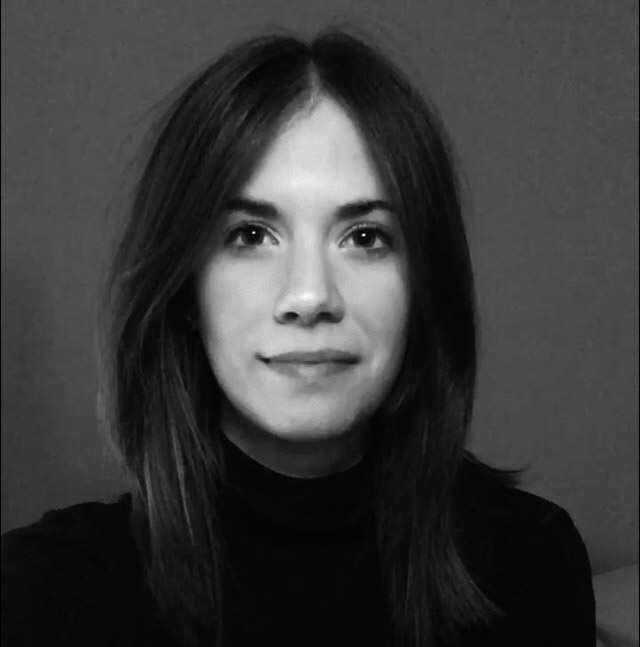
Giornalista e ricercatrice indipendente, scrive di cultura, teatro e attualità per testate online, riviste di settore e accademiche. È stata speaker e redattrice per Radiocittà Fujiko, ha co-curato un documentario radiofonico per RSI ed è audio-editor per radio e associazioni. Cura progetti di studio e divulgazione sull'audio fiction e sul rapporto tra teatro e podcast. Laureata in Dams e in Italianistica, si forma in giornalismo, radiofonia e podcasting attraverso workshop (Chora Academy, Centro di giornalismo permanente, Dinamo Press), masterclass (La Biennale di Venezia, Lucia Festival), corsi professionalizzanti (audio engineering base AFM Bologna).
-
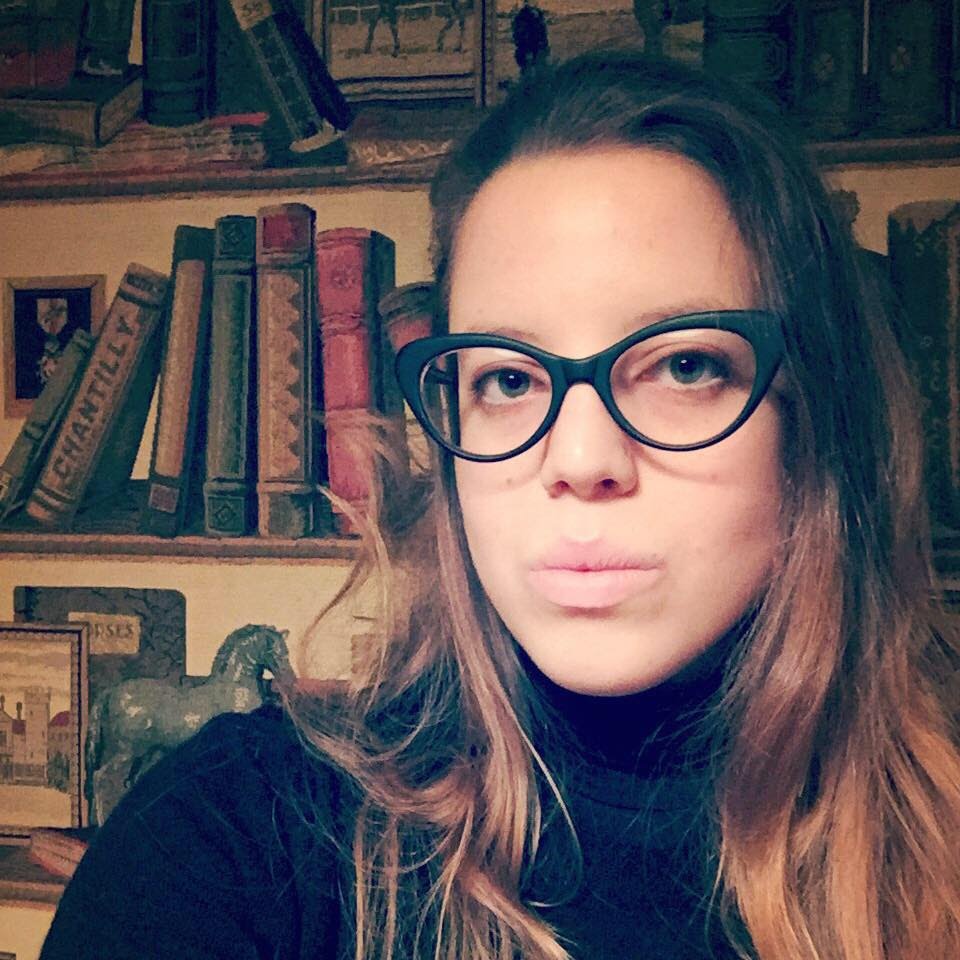
Giornalista pubblicista, tra le varie collaborazioni attualmente lavora presso l'Ufficio Stampa di Arte e Architettura alla Biennale di Venezia. Laureata in Lingue a Trieste, nel 2018 si diploma alla Scuola Paolo Grassi di Milano in Organizzazione Teatrale. Ha lavorato in ufficio stampa e comunicazione per teatro, tv e musica, mentre nell'ambito organizzativo per festival di teatrodanza e per la compagnia DLT - DopoLavoro Teatrale con sede a Toronto (Canada).


